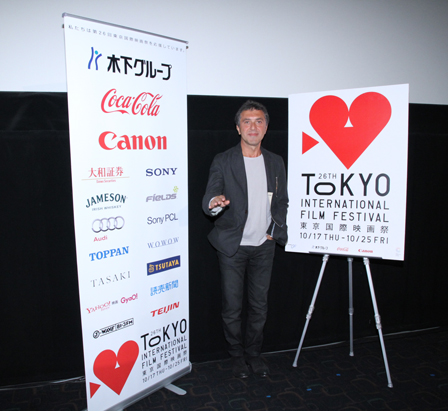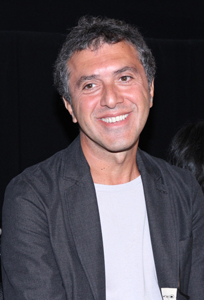
“Singing Women” Press Conference
Reha Erdem (Director/Screenplay/Editor)
Reha Erdem’s “Singing Woman” is a dark, mysterious film. It takes place on an island not to far from Istanbul. Earthquakes, brooding weather and the landscape reflect the emotional states of his characters. The worlds of men and of women are starkly contrasted. Women – elemental, closer to the earth. Men – caught in their ideas of tradition, confused. Horses, many dying from some mysterious illness quietly observe the human drama that unfolds before their soulful eyes.
When queried about the many meanings of his films, Erdem succinctly stated, “No matter what it is, this is depicting the hope that I have for human beings.”
And further pushed about any social commentary that his film posits, he brought up a fundamental philosophy about his filmmaking.
“If you’re asking if I make social comments, I don’t really think so. I just want to tackle the issues of human beings as one human being. I don’t really like films that try to give answers, nor do I like people who try to give answers. I prefer more about people who ask questions or things that ask questions. Because if you give answers, I think that, in a sense, kills everything. So I would like to work together with people or beings that ask questions. And that, I think, clears up your mind to have more open thinking.”

Further elucidating his ideas about filmmaking he added, “Well, this film has, in the first place, no hidden messages. I think a film will only become a film when it’s viewed by an audience. And I think there are many entrances or gates to go into that film. So, I think you can go in from any gates you wish, or you can go out from any exit you wish. And regarding the interpretation of the film, I think if someone interprets the film in some way that was totally unexpected, that really gives me hope. So, I think it’s really free. This film has many entrances and gates. There are many paths you can take. And it has different layers that you can explore. So, if you, maybe, see this film once again in 10 years time, you might find a different interpretation or you might find a different path. And that’s the kind of style I have adopted in this film. And if you look at it again at a later time period and find a different path, then that will be very valuable for me.
And of course, all filmmakers have favorite directors, whether peers or past giants. Erdem brought up his love of a particular Thai director.
“There is one particular filmmaker I really like, Apichatpong Weerasethakul.”
“When I watch his films, I want to go into that world and just lie down and relax. So, depending on who watches the film, I think that they will get different emotions and feelings, depending on the person. Someone might get really exited. Or someone might really relax or might feel peaceful. That sort of different style that gives different paths to different emotions is what I try to put in my films.”
Both filmmakers make challenging film that for the intelligent cineaste offer big emotional rewards.








